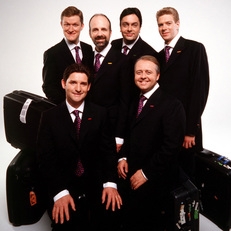 The King's Singers: sempre sotto voce.
The King's Singers: sempre sotto voce. The King’s Singers aren’t just an ensemble – they’re an institution. Founded at King’s College Cambridge in 1968, the vocal sextet now contains none of its original members. However, with about 150 recordings to their credit and countless tours around the globe, they’ve built a strong brand-name and a devoted fan-base.
The King’s Singers’ claim to fame rests chiefly on the group’s remarkable ability to perform intricate vocal works with just one singer per part. The Singers do this brilliantly: they’ve cultivated a style that’s all about purity, clarity, precision and balance.
However, as Sunday’s concert revealed, adherence to this way of doing things can be limiting. Throughout the program, musical expression was hobbled by a strict regime of poise and delicacy: dramatic moments were rare, and only rarely did the volume-level reach a respectable mezzo-forte. Sometimes, when the repertoire suited this approach, the results were quite charming. But there were also works on the program that would have benefited from more robust approach.
The Singers opened with a set of sacred works by Orlando Lassus (his Magnificat: Praeter Rerum Seriem and his Resonet in laudibus), and William Byrd (Vigilate and Beata viscera Mariae virginis). Despite a technically flawless delivery, the sextet wrapped this music in a pall of solemnity – and the result was, frankly, a little tedious.
Three carol-anthems by Herbert Howells followed: Here is a Little Door, A Spotless Rose and Sing Lullaby. And here, the Singers’ coy approach seemed to fit nicely. A pair of Mittel-European folk-carols – Maria durch ein Dornwald ging and Szczo to za prediwo – received pleasantly mellifluous performances. The same could be said of The Little Road to Bethlehem, by Michael Heard.
A set of four little part-songs by Francis Poulenc – collectively titled Un soir de neige – offered hope for a broader range of expression. Yet while the Singers’ skilful handling of Poulenc’s tricky harmonies was impressive, their penchant for restrained elegance (with the emphasis on “restrained”) dampened the songs’ dramatic impact. A group of Catalan folk-carols fared a little better: La filadora was ever so slightly jazzy, and El niño querido was as smooth as silk.
The King’s Singers ended the concert with a group of Christmas songs sung from memory. As with the rest of the program, the selections that worked best were those that were well suited to the Singers’ signature style. Stille Nacht (“Silent Night,” in German) and The Christmas Song (better known as “Chestnuts Roasting On an Open Fire”) went very well. However, a twee arrangement of God Rest Ye Merry Gentlemen, in 5/4 time (with a nod to David Brubeck’s Take Five) was a dubious choice.
© Colin Eatock 2014
 RSS Feed
RSS Feed

